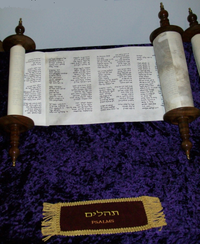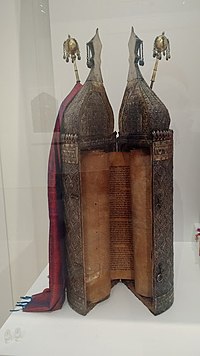| Part of a series on |
| Islam |
|---|
 |
Islamic holy books are certain religious scriptures that are viewed by Muslims as having valid divine significance, in that they were authored by God (Allah) through a variety of prophets and messengers, including those who predate the Quran. Among the group of religious texts considered to be valid revelations, the three that are mentioned by name in the Quran are the Tawrat (Arabic for Torah), received by prophets and messengers amongst the Israelites; the Zabur (Psalms), received by David; and the Injeel (Arabic for the Gospel), received by Jesus. Additionally, the Quran mentions God's revealing of the Scrolls of Abraham and the Scrolls of Moses.



Muslims hold the Quran, as it was revealed to Muhammad, to be God's final revelation to mankind, and therefore a completion and confirmation of previous scriptures, such as the Bible.[1] Despite the primacy that Muslims place upon the Quran in this context, belief in the validity of earlier Abrahamic scriptures is one of the six Islamic articles of faith. However, for most self-identified Muslims, the level of this belief is restricted by the concept of tahrif.
The Islamic methodology of tafsir al-Qur'an bi-l-Kitab (Arabic: تفسير القرآن بالكتاب) refers to interpreting the Qur'an with/through the Bible.[2] This approach adopts canonical Arabic versions of the Bible, including the Tawrat and the Injil, both to illuminate and to add exegetical depth to the reading of the Qur'an. Notable Muslim mufassirun (commentators) of the Bible and Qur'an who weaved biblical texts together with Qur'anic ones include Abu al-Hakam Abd al-Salam bin al-Isbili of al-Andalus and Ibrahim bin Umar bin Hasan al-Biqa'i.[2]
- ^ Glasse, Cyril. "Holy Books". Concise Encyclopedia of Islam.
- ^ a b McCoy, R. Michael (2021-09-08). Interpreting the Qurʾān with the Bible (Tafsīr al-Qurʾān bi-l-Kitāb). Brill. ISBN 978-90-04-46682-1.